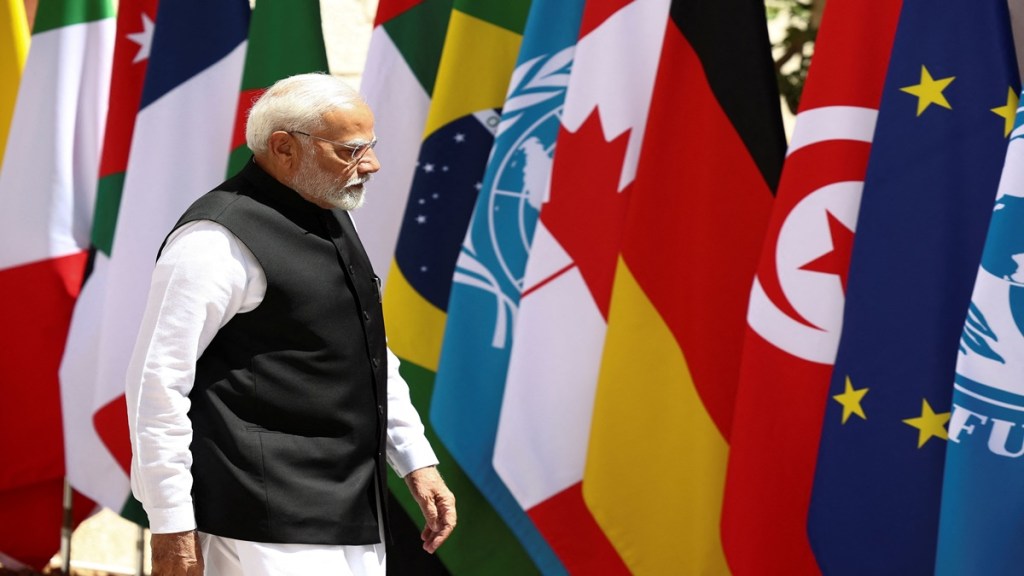At the Outreach Session of the Group of Seven (G7) Summit, held in Apulia, Italy, Prime Minister Narendra Modi seized the opportunity to draw the attention of world leaders towards the Global South, particularly highlighting the issues facing Africa.
Upon his arrival at the summit, Modi was warmly welcomed by Italian Prime Minister Giorgia Meloni. Following a brief exchange, Modi addressed the Outreach Session, which focused on significant topics such as Artificial Intelligence, Energy, Africa, and the Mediterranean.
Modi underlined that India has always considered it its responsibility to voice the concerns of the Global South on the global stage. He noted that under India’s G20 presidency, the African Union was admitted as a permanent member of the G20, marking a significant achievement and honor for India.
In his address, Modi highlighted India’s commitment to its Artificial Intelligence Mission, aptly named “AI for All.” He stressed that this technology should be used to foster progress and enhance the well-being of all individuals. To achieve this goal, India is fostering international collaboration as a founding member of the Global Partnership on Artificial Intelligence.
Modi also discussed India’s environmental goals, specifically the target of achieving net zero carbon emissions by 2070. He emphasized the importance of sustainable development and India’s dedication to achieving this ambitious goal.
During his visit, Modi met with Pope Francis at the summit venue and invited him to visit India. He expressed his admiration for the Pope’s commitment to serving people and improving the planet. Modi shared this invitation on X, formerly known as Twitter, highlighting the significance of their meeting.
French President Emmanuel Macron praised Modi for his initiative on artificial intelligence, acknowledging India’s leadership in this area as the G20 chair. Macron’s commendation underscored the global recognition of India’s efforts in advancing AI technology for the benefit of all.
On the sidelines of the G7 Summit, Prime Minister Modi held bilateral meetings with several world leaders, including French President Emmanuel Macron, UK Prime Minister Rishi Sunak, and Ukrainian President Volodymyr Zelensky. According to the official statement issued by the Ministry of External Affairs, Modi discussed strengthening partnerships in defense, nuclear energy, space, education, digital public infrastructure, and critical technologies with Macron.
Modi and Macron agreed to expand cooperation in artificial intelligence, critical and emerging technologies, energy, and sports. They also committed to working closely in preparation for the upcoming Artificial Intelligence Summit and United Nations Oceans Conference, both of which will be hosted in France in 2025.
Prime Minister Modi’s meeting with UK Prime Minister Rishi Sunak focused on enhancing bilateral ties in trade, investment, and technology. Both leaders reiterated their commitment to a strong and mutually beneficial partnership. Discussions included potential collaborations in healthcare, climate change, and education.
In his meeting with Ukrainian President Volodymyr Zelensky, Modi expressed India’s support for peace and stability in the region. They discussed humanitarian aid and the importance of diplomatic solutions to conflicts. Modi emphasized India’s willingness to contribute to rebuilding efforts and provide necessary support to Ukraine.
During his address, US President Joe Biden acknowledged India, along with Brazil and Argentina, as critical partners in the global supply of minerals essential for clean energy technologies. Biden’s mention of India in this context underscored the country’s growing strategic importance on the world stage.
Throughout the summit, Modi’s focus remained on advocating for the Global South. He called for a more inclusive approach to global issues, ensuring that the voices and concerns of developing nations are heard and addressed. Modi’s participation in the G7 Summit underscored India’s growing influence on the global stage and its commitment to fostering international cooperation for a better future.
